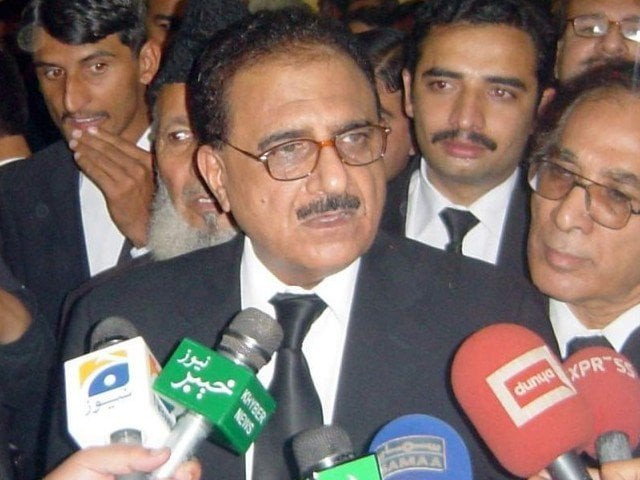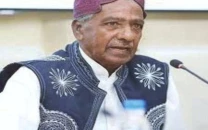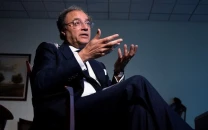Justice (retd) Dost Mohammad Khan - a nontraditional, outspoken judge
Recently appointed K-P caretaker CM, Khan retired as SC judge on March 19

Supreme Court Justice Dost Muhammad Khan. PHOTO: IQBAL HAIDER
Known as an outspoken judge, Justice Khan retired on March 19. The judge had famously refused full court reference and farewell dinner which led to three provincial bar association to pass resolutions for not arranging full court reference and farewell dinner in his honour.
The new interim provincial chief executive is one of the judges who refused to take oath under the Provisional Constitutional Order (PCO) in November 2007. Justice Khan is known for speedy trials and his public stance on across-the-board accountability – which includes judges and generals.
Appointed in September 2002 as a Peshawar High Court additional judge, Justice Khan became the PHC chief justice in November 2012 before being elevated to the apex court in January 2014.
Justice Khan was part of a special bench, head by Justice Asif Saeed Khosa, which has decided more than 10,000 criminal petitions and acquitted many death-row prisoners during the last three to four years.
Dost Mohammad Khan appointed K-P caretaker CM
The retired judge had a strict stance on enforced disappearance. Over the course of his career, Justice Khan passed several directives to trace missing persons. Due to his efforts, the whereabouts of around 2,500 missing persons were traced and 900 of them were shifted to different internment centres in 2013.
In 2015, the judge while issuing a dissenting note had also annulled the 21st constitutional amendment, which allowed the trial of civilians in military courts.
“As the Armed Forces are directly engaged in a fight with the Terrorists, any person captured in the course of combat, the investigator into the crime and the Judge presiding the Military Court would certainly belong to the Armed Forces and being party to the conflict therefore, they may be held to be Judges in their own cause. Thus, trial of such civilians by the Military Courts would certainly violate this inviolable universal principle of independent justice. On this account too, such trial would be ab-initio void,” said Justice Khan in his dissenting note in the 21st constitutional amendment case.
In December 2017, the judge while hearing a matter related to the National Accountability Bureau (NAB) had said that he supported the idea of bringing the judges and generals under the accountability law. Stressing on the need for across-the-board accountability, he said judges and generals should be accountable like common citizens and asserted for transparency in the process.
SC judge who cared for the missing set to retire
Justice Khan had been of the view that political parties should resolve their disputes in the Parliament instead of resorting to the courts. He said political instability increased chances of a martial law.
The retired judge said it was incumbent on the political forces to fix their issues through a political process rather than bringing their issues to judiciary.



















COMMENTS
Comments are moderated and generally will be posted if they are on-topic and not abusive.
For more information, please see our Comments FAQ